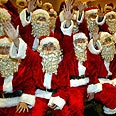
Who's afraid of a Christmas tree?
New immigrants prevented from spending holiday as they see fit
It would be hard to find a better example of narrow mindedness and imperviousness than the one provided a few days ago by Amidar - the National Housing Authority. The Authority banned residents from bringing decorated Christmas trees into public areas under its management. The ban included other familiar trappings symbolizing the end of the Christian year, known here by the "kosher" term the "Civilian Year."
The explanation provided on behalf of the public authority - published in the press - was based on the fact that more than 80 percent of the housing project's immigrant residents are Jewish. Complaints showed that the bearded character of Santa Claus, dressed in a red coat and carrying a bundle of toys for the youngsters, is offensive to religious residents. Very offensive.
Hanukkah, a strictly kosher Jewish festival, has just ended and it is continuously gaining widespread popularity worldwide. In the US for example, at cities with Jewish communities, giant Hanukkah lamps are lit in public places, yet complaints by Christian or other communities are unheard of.
Their numbers no doubt are higher than 80 percent of the population, but they do not complain that lighting the Jewish candle offends their religious beliefs. On the contrary, even the White House adapts itself to kosher requirements and conducts a Hanukkah ceremony, which is filmed and broadcast without fear of the Church's response.
'They remained Jewish'
Amidar representatives could take a tour of Europe ? no one it seems would object to such a proposal. In Europe they would see Hanukkah lamps at the entrances of Jewish institutions and synagogues. They would partake in ceremonies held by local officials at capitals and small outlaying cities; they could savor sufganiyot alongside local residents of firm Christian beliefs who wouldn't sound any complaints.
On the contrary, often they would ask for another sufganiya, despite its heavy emotional baggage, weightier than the number of calories.
Freedom of religion and belief, religious tolerance, openness and understanding between different religious denominations were always at the core the Jewish people's historic yearning.
Looking at the chart of human suffering rooted in religious persecution, the Jewish people are positioned very high up. How then can such a comprehensive ban imposed by a national Israeli company be understood? Does it stem from the fear that the Jewish religious faith of some of the residents is so shaky that just one glance at the decorated Christmas tree would make them consider conversion?
These are new immigrants after all, whose life until this point in time was spent in foreign places among communities of different faiths. It would be reasonable to assume that they passed by churches bearing a cross or statues of Jesus almost on a daily basis; that they lived on streets bearing names of Christian saints, and that they witnessed other such religious "provocations." Yet despite this they remained Jewish.
It would seem that further thought by someone at Amidar should lead to an apology to those who were prevented from spending the holiday as they saw fit.










